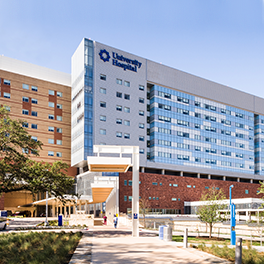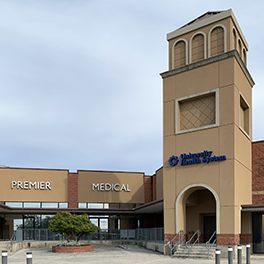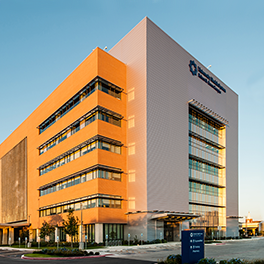We want you to be comfortable and during any procedure you have with us. At University Hospital, we have some of the most knowledgeable and experienced board-certified anesthesiologists in San Antonio to guide you every step of the way — starting before your procedure and continuing all the way through recovery.
Types of Anesthesia
Anesthesia is safe, and your anesthesiologist will be by your side to ensure everything goes smoothly. The kind of anesthesia you receive will depend on the type of procedure you’re having, your medical history and your personal preferences.
General anesthesia
Patients are completely asleep during the procedure and feel no pain. The anesthesia may be given through a breathing tube or an IV line. This type of anesthesia is used for longer or more complicated procedures.
Sedation anesthesia
Patients are in a profound state of sleep, but they breathe without assistance. Sedation anesthesia is used for brief procedures.
Regional anesthesia
Specific body parts are numbed during surgery or another procedure. For example, epidural anesthesia is often used during childbirth, and it may also be used for other procedures. Nerve blocks may be used for acute pain or post-surgical pain.
Local anesthesia
This anesthetic may be given as an injection or absorbed through the skin. It’s typically used for minor surgery in a specific area.
Some types of anesthesia may be unsuitable for patients with certain health conditions, and some patients may prefer one type of anesthesia over another when there’s more than one option for the procedure. Your anesthesiologist will guide you through the process to minimize anesthesia risks and choose the right type of anesthesia for you.
Before Your Procedure
Your doctor will perform a full health assessment before your procedure to discuss your medical history and identify any health concerns that might affect your safety under anesthesia. Your anesthesiologist will personalize your anesthetic plan for your individual needs and preferences.
Please tell your anesthesiologist about your medication history, lifestyle habits and any other information critical to your health. These details can change the way anesthesia affects your body and your recovery.
Some topics may be difficult to discuss, but it’s important that your doctor know this confidential information ahead of time to reduce any potential complications of the anesthesia, so you stay safe throughout your procedure.
These topics may include:
- Any known food or drug allergies
- Past or current use of tobacco, illicit drugs or alcohol
- Past reactions to anesthesia
- Prescription and over-the-counter medications
- Vitamins or herbal supplements
Our anesthesiologists are here to answer any questions you may have about pain management during your medical procedure. No concern is too small to discuss — we welcome all of your questions.
If you are planning to go home after receiving anesthesia, it is important for you to have an adult who can drive you home and look after you immediately after anesthesia.
While most of the anesthesia has gone away by the time you are discharged, there could be some lingering effects that could cause you to have difficulty driving safely or operating any machinery. Planning for someone to help you in advance is very important.
During Your Procedure
Our anesthesiologists work as a team to ensure there’s an anesthesia expert in the room with you at all times. Your anesthesia team will consist of a physician anesthesiologist who may also be working with a Certified Registered Nurse Anesthetist. A professional from your team will always be at your side.
Whether you’re having local anesthesia or going completely to sleep, your anesthesiologist will monitor your heart rate, blood pressure and oxygen levels throughout the procedure. If you’re undergoing general anesthesia, your anesthesiologist will help you transition to recovery.
After Your Procedure
Your anesthesiologist will monitor you in your recovery room, continuing to provide pain relief as needed. Please don’t hesitate to ask any additional questions you may have — we are dedicated to your safety.
You might experience these symptoms after your surgery:
- Difficulty urinating
- Dizziness
- Muscle achiness
- Nausea
- Shivering
- Sore throat and dry mouth (from the breathing tube)
When you’re ready to go home, your anesthesiologist will ensure you have all the follow-up instructions you need for a successful home recovery.
Keep these things in mind as you prepare to leave our care:
- Closely follow your anesthesiologist’s orders about when to begin eating and drinking
- Don’t smoke
- Make sure you have someone to drive you home
- Take any medications your doctor gives you exactly as prescribed
- Tell your anesthesiologist if you experience any reactions to your medications
Our Exceptional Doctors and Nurses
University Health partners with UT Health San Antonio to bring in physician anesthesiologist faculty members and nurse anesthetists to care for more than 30,000 patients every year. Because we accept referrals from smaller hospitals all over South Texas, our anesthesiologists must have both broad and comprehensive knowledge to handle any kind of pain situation.
Our faculty members are board-certified in many anesthesiology specialties, including:
- Cardiothoracic anesthesia
- Critical care medicine
- Neuroanesthesia
- Obstetric anesthesia
- Pain management
- Pediatric anesthesia
- Trauma anesthesia
We have a dedicated group of anesthesiologists with unique expertise, including anesthesia for high-risk obstetrics and liver transplants. Our anesthesiologists also help patients manage acute pain and chronic pain situations.
Because we’re a teaching hospital, our physicians are at the forefront of the most current medical research and best practices. University Health and UT Health San Antonio anesthesiologists also contribute their own research to advance the field of anesthesiology.



